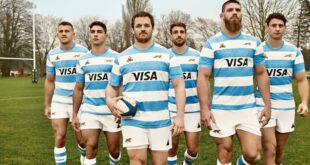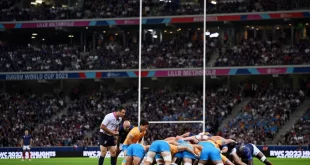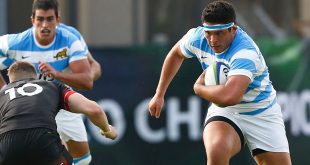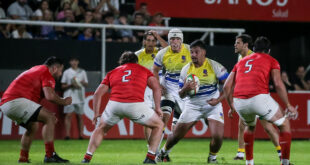Los Jaguares’ inaugural Super Rugby campaign involved fifteen matches. Of these the return was four victories, an insignificant total for the season to be deemed successful. Numerous questions from a variety of people as to ”what went wrong” have been asked. On social media alone I have been contacted by Argentine supporters and fans in general.
To those still puzzled over what eventuated or curious to read my views on the matter I offer you the following Forward Thinking editorial. In it I will offer ten factors which played their part in Los Jaguares’ campaign.
Make no mistake, Los Jaguares did not perform as well as fans were hoping. They also fell short of their expectations as a team. This is clear based on interviews with countless members of the roster. The general trend based on what players have said is that they were expecting it to be tough but believe they should have done better.
This editorial is by no means a critique of the team, of individuals in it or of the administration. Instead it is what I offer to those seeking answers. The Argentine team tried very hard and did, at times, play very well. The experience ought to do the franchise the world of good for future ventures.
1. High Risk approach
Los Jaguares played a high risk strategy which brought with it a high error rate. The Argentine franchise were able to make breaks but regularly took changes which did not go their way. This included off-loading as a frequent tactic. Too often balls did not find a support player with it either going loose or being knocked-on.
Although Super Rugby has a reputation for being attacking the numbers paint a picture of Los Jaguares playing high-risk rugby but not turning it into points. Countless instances occurred in which an error turned over possession and gifted the opposition points. Some cases:
- Lourens Erasmus scored for the Lions from a wayward pass from Javier Ortega Desio.
- A Nicolás Sánchez pass was intercepted by Francois Ventor who scored from 65m for the Cheetahs
- Knock-ons from Juan Martín Hernández and Pablo Matera saw Richie Mo’unga and Israel Dagg score for the Crusaders.
- Highlanders center Rob Thompson scored from a loose pass from Jerónimo de la Fuente.
- Stefan Watermeyer intercepted a Joaquín Tuculet pass to score for the Kings.
Of this sampling a common factor is that Los Jaguares were close to or inside the opposition half. This signals a problem which the coaching staff are required to repair. A means of providing cover defense is essential to winning when playing high risk rugby.
Also clear is that it is not a case of singling out individual players for their handling errors. The fact is a broad range of players turned over attacking possession which gave the opposition tries. All of those named above played at the World Cup for Argentina.
Added to this very problem is the fact that scoring more tries need not translate into a victory. Los Jaguares outscored the Sharks by two tries to one in Durban yet lost. In losing against the Sunwolves in Tokyo the Argentine side scored four tries to three. At home the Jaguares scored three tries and conceded one against the Sharks in another loss.
2 Many players are to miss the Rugby Championship
Los Jaguares are not Los Pumas. This phrase was repeated endlessly in the Argentine media before, during and after the Super Rugby campaign. What it was attempting to clarify is that while the roster was loaded with leading Argentina players there were also others, often uncapped, involved.
Experimentation occurred frequently as did player rotation. Felipe Arregui, Rodrigo Báez, Emiliano Boffelli, Gonzalo Bertranou, Facundo Gigena, Juan Cruz Guillemáin, Ignacio Larrague, Joaquín Paz, Roberto Tejerizo and Segundo Tuculet are all cases in point. All received Super Rugby game time but were not selected for the Rugby Championship.
Staggering to think that they have been omitted yet 32 others from Los Jaguares made the roster.
3 The Jaguares travelled far further than Kiwi teams
The two teams with the largest distances to travel were Los Jaguares and the Sunwolves. The Japanese side covered a distance of 80,207 km. In second spot was Los Jaguares who covered some 67,604 km. Compare this to the average distance of New Zealand sides which was 24,033km. Australia’s teams averaged 28,822 km and South Africa’s averaged 30,391 km.
The Crusaders total distance was under 20,000 and the Hurricanes just above that figure. Next in line was the Brumbies. All three of these teams made the Quarter Finals. The lowest traveling South African side was the Kings whose distance of roughly 25,000km was slightly below that of the Blues, Chiefs and Highlanders.
No New Zealand franchise traveled more than 27,000km. The Western Force travelled 10,000km more than this and the Bulls covered 11,000km more. Notable distances but Los Jaguares covered an additional 40,000km.
With such a large distance to travel Raúl Pérez opted to split the roster at times. This saw one group named for the first two matches of the New Zealand tour and a separate one named for the third match as well as the game in Japan.
4 Jaguares did not face some weak sides
Los Jaguares finished the regular season in 13th position. The five lower placed sides were the Reds, Southern Kings, Sunwolves and Western Force.
Los Jaguares suffered a late defeat against the Sunwolves which should never have been a defeat. It was the fourth match in as many weeks away and Los Jaguares were hit by injuries. The roster, nonetheless, was strong enough. The Sunwolves failed to win any other match.
Against the Kings, Los Jaguares won the first match 73-27 at home. The return match then saw two Jaguares forwards red carded in the opening half. Some how the Argentines led until late in the match before a third player was sent off which saw the Kings take the lead and go on to win.
Los Jaguares did not face the Reds or Western Force. They did, however, play all but one of the top eight. Of the Semi Finalists Los Jaguares played all of them at least once.
5 Most Jaguares are young
A lack of experience was evident. Success in the first year in joining an established competition is extremely challenging. For Los Jaguares it was further complicated by having a high number of young, inexperienced players.
In total 41 players took to the field for Los Jaguares. Of them 4 were aged over 30 – Agustín Creevy, Juan Martín Hernández, Juan Manuel Leguizamón and Leonardo Senatore. By way of comparison 24 were aged under 25.
Many were playing professional rugby for the first time. Straight out of the under 20’s were a number of players including Emiliano Boffelli, Marcos Kremer and Ignacio Larrague.
6 No referee speaks Spanish
All Super Rugby matches were officiated entirely in English. This included calls with the ball in play, talking to the captain and directing set-piece play. For Los Jaguares matches no calls at all took place in Spanish and nor do any of the Super Rugby officials speak the language.
Some may say that is tough but it does not make it right. Test rugby may well be in English universally but Top 14 matches are all refereed in French. The same is true of other non-English speaking countries with their respective languages being the norm.
South Africa has English as an official language, meaning the players all ought to have a command of the language. Thus communication will be smooth. Consider then that many Jaguares players do not speak English. Captain Agustín Creevy is one of them. His English is still significantly better than prop Roberto Tejerizo but far from being the level of other leaders from recent times including Juan Fernández Lobbe, Thierry Dusautoir or Victor Matfield.
7 Injuries mounted
Injuries are normal in rugby and expected. Replacements exist for this purpose as do wider rosters which usually obtain three players per position. It is, nonetheless, common for wider roster members to train but receive no game time. Countless exampled exist of Americas players based in Europe who play sparingly for the top side.
Los Jaguares though had an unusually high number of injuries to juggle. At one stage only one second-rower was fit. This saw a flanker, Javier Ortega Desio playing out of position. Third choice fly half Santiago González Iglesias started against the Blues while third choice fullback Ramiro Moyano even started matches out of position on the wing.
Up front the loss of Ramiro Herrera and Nahuel Tetaz Chaparro to injury meant the uncapped Felipe Arregui started against the Stormers. Arregui did not have a Super Rugby contract and nor did Roberto Tejerizo who started at loosehead prop against the Blues.
Missing the New Zealand tour was Santiago Cordero. The World Cup flier suffered a car accident in Buenos Aires which meant he was ruled out on the day of the flight. This caused further problems and a shuffling of the roster eventuated.
8 Los Pumas 7’s
The Los Pumas 7’s program disrupted the team on several occasions. Santiago Cordero, Matías Moroni, Ramiro Moyano and Javier Ortega Desio were all summoned by Santiago Goméz Cora for international duty.
This left a hole for Rául Pérez to fill as the players were called-up in the middle of the Super Rugby season. With Moroni missing and Jerónimo de la Fuente injured Pérez selected Segundo Tuculet who made his one and only appearance against the Kings in May.
Cordero would also miss the second South African tour which resulted in Pérez rotating his wingers. It came at a time when Manuel Montero was injured. As such Matías Orlando started one match out of position and Lucas González Amorosino played in the second. Emiliano Boffelli started on the wing in both games only to suffer a sever injury which ended his campaign.
9 The style of play is different than Europe
Many of the big signings unveiled by the UAR were players returning from Europe. Agustín Creevy, Lucas González Amorosino, Juan Martín Hernández, Ramiro Herrera, Tomás Lavanini and Juan Manuel Leguizamón. They all did well for themselves abroad, doing so in the Aviva Premiership, Guinness Pro 12 or Top 14.
The travel factor in Europe is minimal while the style of play is utterly different to that of Super Rugby. In looking to carry over to the test side the policy of playing aggressive, running rugby was employed. It was, nevertheless, extremely foreign to rugby they grew up playing in Argentina just like it it to the rugby played in Europe.
Both veterans and young players therefore were asked to do something they are not widely accustomed to doing. Training started in January. The season began in February. The solution being put forward is for Los Pumitas to play with greater width and try to replicate Daniel Hourcade’s plan at junior level. The trouble is this only began in 2016.
10 Coach lacks professional experience
The UAR appointed Rául Pérez as Head Coach. He was chosen as a man who knows the Argentine scene very well. He earned 21 caps for Argentina from 1992-1999 and after retirement he took up coaching. He coached Rosario club Duendes before coaching the Rosario under 23 side and Argentina’s under 21 side from 2007-2008.
He was video analyst for former Pumas Head Coach Santiago Phelan and coached the Pampas XV in the 2014 Pacific Cup. He had also been an assistant to Daniel Hourcade with Los Pumas.
His impressive resume nonetheless was missing previous experience coaching a professional team. Unlike Pérez, Hourcade returned from coaching in Europe to coach the Pampas XV.
The likes of Mario Ledesma and Gonzalo Quesada are both doing very well for themselves as professional coaches. Indeed both are tipped to be involved with Los Pumas in the future. Consider then that Pérez was thrust into Super Rugby. An extremely difficult task.
 Americas Rugby News Rugby news from across the Americas!
Americas Rugby News Rugby news from across the Americas!




